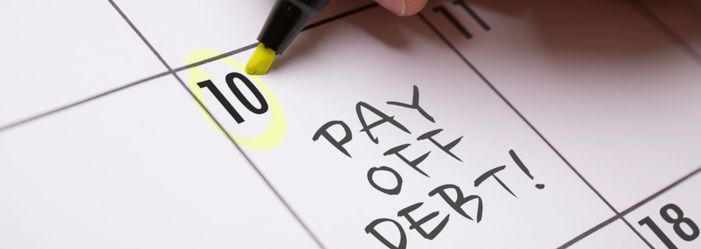Last Updated: March 19, 2024
Break Free from the Emotional Toll of Debt

Disclaimer: We are not qualified legal or tax professionals and are not giving advice. Always speak with a qualified professional before making any legal or financial decisions.
Debt and depression: a cycle that's hard to break but not impossible. Many find themselves caught in the grip of financial woes and mental health struggles, each feeding into the other. But what if you could find a way out?
This post dives into the intertwined nature of debt and depression, uncovering the root causes and offering a lifeline through actionable advice and resources.
It's time to take the first step towards a brighter, debt-free future.
If you'd rather speak to a debt specialist now, click here for a free consultation.
Understand that you are not alone
According to a study by the American Psychological Association, roughly 72% of Americans have felt overwhelmed by their debt at some point and suffer mental health issues.
Since roughly 80% of Americans have debt in some form, that means that pretty much everyone is struggling with financial worries somewhere along the line.
Here are some startling statistics:
- Average total debt: $165,388
- Total credit card debt, including revolving and transacting balances: $17,066
- Average revolving debt (credit cards) carried month to month: $7,486
- Average mortgage: $222,592
- Average car loans: $28,975
- Average student loan debt: $58,238
You'll note that medical bills are not included, but most Americans carry medical debt. This level of financial stress can affect both your mental and physical health. Let's look at some things you can do to improve a person's mental health and decrease debt depression.
Ways to Deal with Debt Depression and Help your Mental Health
Financial worries can cause serious mental health issues.
Seek professional help if you are feeling suicidal or unable to manage debt
Professional mental help can make a huge difference. If you are having mental health problems related to depression, talking to your doctor or a therapist can be very helpful. There is no shame in asking for help!
Your doctor can refer you to a counselor and help with medication. Some counselors work on a sliding scale rate, and free mental health apps can help.
If you have thoughts of harming yourself and need help immediately, dial 988.
Symptoms of Depression
According to the Mayo Clinic, the most common symptoms of depression include the following:
- Feelings of sadness, tearfulness, emptiness, or hopelessness
- Angry outbursts, irritability, or frustration, even over small matters
- Loss of interest or pleasure in most or all normal activities, such as sex, hobbies, or sports
- Sleep disturbances, including insomnia or sleeping too much
- Tiredness and lack of energy, so even small tasks take extra effort
- Reduced appetite and weight loss or increased cravings for food and weight gain
- Anxiety, agitation, or restlessness
- Slowed thinking, speaking, or body movements
- Feelings of worthlessness or guilt, fixating on past failures or self-blame
- Trouble thinking, concentrating, making decisions, and remembering things
- Frequent or recurrent thoughts of death, suicidal thoughts, suicide attempts, or suicide
- Unexplained physical stress problems, such as back pain or headaches
These mental health symptoms will cause problems with day-to-day work, school, relationships, and social activities.
Take small steps every day to get yourself out of debt
When you are depressed, even the smallest activities can seem daunting, especially managing debt that won't go away. Make a list of steps you need to take to complete a task, and then tick off what you have done. The small success will help your mental health. Your therapist may recommend a similar technique.
Depending on your depression, even getting out of bed can be impossible. Start with 1. Open eyes, 2. Sit up, 3. Push back covers, 4. Swings legs out of bed, 5. Stand up. Does this seem too detailed? Depression can create an inability to accomplish even the simplest tasks, so break down your list to as small as you need to and tick off your successes.
Make a budget
Understanding where your money comes from and is going towards is vital in managing money.
A budget is only as complex as you want it to be. Your first step is the track your spending for a month or two. Write down every penny you spend.
Next, categorize your spending into wants and needs. You must need to survive - generally, this is food, shelter, and clothing. This includes utilities and health care, especially health insurance.
A want is something that makes life worth living. In the first phase of controlling your spending habits, you'll want to cut out many of your wants and stop impulse spending. This is temporary. Remember that you may not want to cut all of them out - decrease your spending.
Write down your debts, the interest rates, due dates, and the total amounts owed.
Record all your income and subtract your expenses. If the total is not either zero or positive, cut expenses until it is.
Follow this budget!
Read The Ultimate Guide to Saving Money for more information about budgeting your money.
Cut back on expenses
Look at your expenditure to see where you can eliminate spending. Your goal in this is to cut expenditures and set aside money temporarily. Even small changes make a huge difference.
Some people have found that taking a 30-day spending break is a good way to reset their spending habits. In this, you want to pay for necessary items and monthly bills, but not spend on anything else for thirty days.
Create a payment plan
Take a look at your debt and see how it can be paid down. There are two ways to pay off debt without taking out a loan or declaring bankruptcy.
The first way is the Snowball Method. You focus on paying off the smallest loans first while maintaining minimum debt payments. As you pay off each loan, that payment amount is placed onto the next smallest loan, and so forth.
The second way is the Avalanche Method. Here you pay off the high-interest debt first, then roll that money onto the next highest-interest-rate debt.
There is not much difference between the two regarding how long it will take or the total interest paid. The main difference is that the snowball method will let you see success more quickly.
You can also combine the two methods by paying off the smallest debt first to free up some cash and then going after the highest-interest loan. It's really about what works for you.
Reach out to your friends and family for support
Your friends and family probably have had the same debt or mental health issues at some point. By working together to hold each other accountable to stick with a spending plan, you may see more success. After all, misery loves company!
You may also want to consider Debtors Anonymous. This program is like Alcoholics Anonymous but deals with debt and mental health. DA offers a support system for creating and sticking to a budget and dealing with mental processes that accompany overspending.
Celebrate each victory along the way, no matter how small it seems
Allow yourself to be happy and proud when you accomplish your task. Make a budget - find a reward (as long as it does not involve spending money). Stick to the budget - hurrah! Pay off a debt - now you're rockin'.
Depression can suck the joy out of life and your faith in yourself, so find ways to bring look for joy and feel accomplished. You will improve your mental health as you celebrate your successes.
Exercise
If you are depressed, your medical care provider will suggest exercise to improve your mental and physical health. According to the Mayo Clinic, the connection between exercise and mental health is clear, even though the mechanism is not well understood.
Since the last thing most depressed people want to do is exercise, start small. Walk ten to fifteen minutes daily with a goal of thirty minutes. Even housework counts as long as you are moving. Set a reasonable goal and celebrate the accomplishment - writing your exercise on a calendar can make you feel more cheerful.
Let exercise replace unhealthy depressing habits like overeating or drinking alcohol. You'll not only feel better mentally, but your physical health will also improve.
Find someone to exercise with. Again, depression sucks your desire to be social, so replace those lost connections with an exercise buddy.
Consider volunteering at an animal shelter as a dog walker. You get a buddy, the dog gets exercise, and an increased chance of being adopted. And being around animals is known to decrease anxiety and depression.
Remember that there is light at the end of the tunnel
When you finally become debt-free, you'll feel incredible relief and happiness. It takes time and patience to get out of debt, and suffering from debt depression makes the journey seem endless and pointless.
Set your goal, focus on it, and celebrate the small achievements along the journey.
FAQ
Our Conclusion
Hey, it's not the end of the world. If you're struggling with debt depression and other mental health issues, know you're not alone. Many people have been there and come out on the other side.
Use the tips we’ve provided to help get you back on track financially and emotionally. And if you need a little extra help, give us a call.
We can help with some student loan debt, personal loans, unpaid bills, medical bills, credit card debt, and other unsecured debt.
Sit down with one of our certified financial counselors and develop a plan to get out of debt and stay out of debt for good.
We offer a free consultation to anyone who is struggling with debt.
*Disclaimer: Pacific Debt Relief explicitly states that it is not a credit repair organization, and its program does not aim to improve individuals' credit scores. The information provided here is intended solely for educational purposes, aiding consumers in making informed decisions regarding credit and debt matters. The content does not constitute legal or financial advice. Pacific Debt Relief strongly advises individuals to seek the counsel of qualified professionals before undertaking any legal or financial actions.
✔ Accredited by Better Business Bureau with BBB A+ rating (4.93 rating and 1678 reviews)
✔ US News and World Reports and Bankrate ranked Pacific Debt Relief as one of “The Best Debt Relief Companies of 2024”
✔ 6.9 star rating by BestCompany.com (over 2379 client reviews)
✔ 4.8 star rating by TrustPilot based (over 1613 verified consumer reviews)
✔ ConsumerAffairs.com Accredited (over 544 verified reviews with an average rating of 5 stars)
✔ A Top 10 Rated Compan by TopTenReviews.com , ConsumersAdvocate.com and Top10debtconsolidation.com
✔ 4.6 star rating by Google (229 client reviews)
✔ 100% rating by SuperMoney (9 client reviews)
Reduce Your Credit Card Debt By Up to Half

BBB Reviews | 4.9/5.0 Rating









 Do Not Sell My Personal Information
Do Not Sell My Personal Information